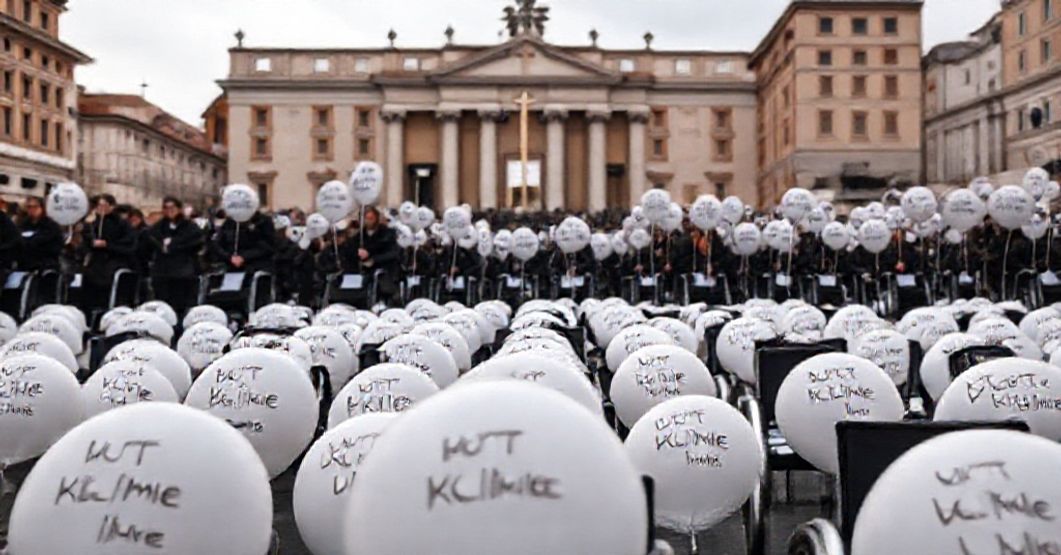Empty Wheelchairs Mask Deeper Apostasy in Italy’s Death Culture
The Catholic News Agency portal reports on a November 4, 2025 demonstration in Rome’s Piazza del Popolo organized by the ProVita & Famiglia group, featuring 200 empty wheelchairs with balloons bearing the message “Don’t kill me” to oppose Italy’s assisted suicide legislation. The article details legislative developments since 2019 Constitutional Court rulings partially decriminalizing euthanasia, with Massimo Gandolfini of Family Day warning of “devastating” consequences based on other countries’ experiences. Activist Emanuel Cosmin Stoica argues the state should focus on improving care rather than offering suicide. The report notes Italy’s inadequate palliative care coverage (33% nationally, as low as 4-5% regionally) while presenting assisted suicide as advancing through parliamentary processes. This superficial treatment of grave moral evil reveals the conciliar sect’s theological bankruptcy.
The Naturalistic Reduction of Life’s Sanctity
The demonstration’s rhetoric exposes the fatal flaw of post-conciliar activism: reduction of moral theology to secular bioethics. While correctly identifying assisted suicide’s dangers, the protest organizers ground their opposition in purely utilitarian arguments – “more care, more rights, more dignity” – rather than proclaiming the lex aeterna (eternal law) forbidding murder regardless of circumstances. This omission mirrors Vatican II’s disastrous abandonment of extra Ecclesiam nulla salus in favor of the false “dignity of man” doctrine condemned by Pius IX’s Syllabus of Errors (1864).
“The state must invest in assistance, psychological support, inclusion, and social networks that leave no one alone.”
Emanuel Stoica’s statement typifies the naturalism pervading neo-Catholic circles. Nowhere does he reference the supernatural finality of suffering taught by Paul: “I fill up those things that are wanting of the sufferings of Christ, in my flesh, for his body, which is the church” (Colossians 1:24). The article’s praise for palliative care omits that modern hospice movements often conceal euthanasia protocols, as documented in the Netherlands’ “terminal sedation” statistics.
Legislative Complicity of the Conciliar Sect
The report’s description of Italy’s legislative timeline conceals the hierarchy’s culpability. When the Constitutional Court first opened to euthanasia in 2019, Bergoglio’s Vatican remained silent – a stark contrast to Pius XII’s unambiguous 1957 declaration: “Never may the private individual dispose of his own life or that of another” (Allocution to Doctors). The current Senate debate occurs under a government led by self-described “Catholics” who implement anti-life policies with impunity, proving the conciliar sect’s inability to form Catholic statesmen.
“The legislation was then sent to the Senate, which has been debating the proposal for three years.”
This legislative paralysis demonstrates the bankruptcy of democratic processes in moral matters. As Pius XI taught in Quas Primas (1925), Christ must reign over legislatures: “Rulers and princes are bound to give public honor and obedience to Christ.” The article’s focus on parliamentary maneuvering implicitly endorses the revolutionary error condemned in Pius IX’s Syllabus (Proposition 39): “The State, as being the origin and source of all rights, is endowed with a certain right not circumscribed by any limits.”
Omission of Eschatological Reality
Nowhere does the article mention the eternal consequences of suicide – a damning silence revealing the conciliar sect’s abandonment of novissimi (last things) theology. The empty wheelchairs symbolize more than physical absence; they represent souls potentially damned by state-sanctioned murder. Traditional moral theology teaches that suicide constitutes mortal sin barring ecclesiastical burial (1917 CIC 1240 §1), yet modern canon law under antipopes has erased these safeguards.
The protest’s rose-colored balloons grotesque parody the red martyrdom roses, reducing spiritual warfare to sentimental street theater. Authentic Catholic resistance would follow St. Paul’s example: “We ought to obey God, rather than men” (Acts 5:29), demanding Italy’s complete rejection of euthanasia legislation rather than negotiating its terms. Until the conciliar sect condemns assisted suicide with the vigor of Pius XII’s Mystici Corporis (1943) against Nazi euthanasia programs, such demonstrations remain empty gestures.
Source:
‘Don’t kill me’: Empty wheelchairs dramatize campaign against assisted suicide in Italy (catholicnewsagency.com)
Article date: 05.11.2025
